Ijraset Journal For Research in Applied Science and Engineering Technology
- Home / Ijraset
- On This Page
- Abstract
- Introduction
- Conclusion
- References
- Copyright
AI Based Mock - Interview Behavioural Recognition Analyst
Authors: Prof. Sakharam Kolpe , Sarvesh Patil, Jay Deshmukh , Suraj Jeughale , Yash Misal
DOI Link: https://doi.org/10.22214/ijraset.2024.61427
Certificate: View Certificate
Abstract
In Present competitive job market hustle, being skilled at interview skills is very vital for current institution graduates looking for further trainings or hiring opportunities. Yet, several Interview Candidates needs suitable preparation for interview situations throughout candidate institute academic years. To discourse this opening, scholars have aims on designing and development of societal skills training classifications to offer candidates with opportunities to boost the interview skills. Job interviews assist as a fundamental means for potential employers to evaluate candidates\' appropriateness for their administrations, deeply depended on communal indications displayed by applicants. our paper offers an advanced method to simulate employment interviews using a communal simulated character as a recruiter, joined with signal processing techniques to examine employer performance, behaviour and sentiments in real-time. The mock-up aims to support candidates, mainly youths, in improving societal skills necessary for job interviews. The anticipated classification includes a real-time community cue recognition classification, a dialog/scenario manager, a behaviour manager, and a 3D rendering environment. Feedback mechanisms integrated into the classification include facial expressions, head nodding, reaction time, speaking rate, and volume, providing candidates with insights into their performance throughout mock interviews. Additionally, a speech-to-text classification assesses grammar, and graphical representations of results facilitate easy comparison of interview performances to track candidates\' progress over multiple sessions. This paper contributes to the interdisciplinary literature on interview assessment and highlights the potential of AI-driven technologies in enhancing candidates\' interview preparedness and social competence.
Introduction
I. INTRODUCTION
In today's dynamic job market, the ability to excel in interviews is paramount for recent college graduates as they navigate pathways toward further studies or employment. However, a significant gap exists in the availability of structured interview practice throughout candidates' academic tenure. Recognizing the importance of equipping candidates with essential social skills for interview success, scholars have endeavoured to develop innovative training classifications. These classifications aim to provide learners with realistic opportunities to hone their interview techniques and adapt to various interview scenarios.
Job interviews serve as critical gateways for potential employers to evaluate candidates' suitability and fit within their organizations. Central to this evaluation process are the social cues exhibited by interviewees, which convey a wealth of information about their communication style, demeanour, and interpersonal skills. Leveraging advancements in artificial intelligence and signal processing, this paper proposes a novel approach to simulate employment interviews. By employing a social virtual character as a recruiter and integrating real- time analysis of user behaviors and emotions, the simulation pursues to propose candidates, predominantly young job seek, a platform to refine their social competencies essential for interview success.
This paper presents a comprehensive overview of the proposed interview simulation classification, delineating its key components, functionalities, and feedback mechanisms. By harnessing facial expression analysis, speech recognition, and graphical representations of performance metrics, the classification aims to provide candidates with actionable insights into their interview skills and facilitate continuous improvement. Drawing from interdisciplinary literature on personality recognition, video interview analysis, and AI-based mock interview evaluation, this study underscores the potential of technology-driven solutions in enhancing candidates' interview readiness and social acumen. Through empirical evaluation and user feedback, the efficacy and practical utility of the proposed classification are explored, contributing to the burgeoning field of interview assessment methodologies and advancing the discourse on the intersection of AI and social skill development.
II. PROBLEM STATEMENT
Despite the serious position of interview assistances in gaining academic or professional openings, many candidates, predominantly recent college graduates, face important tasks in successfully making for job interviews. Traditional instructive settings often absence planned opportunities for candidates to practice and polish their interview practices, ensuing popular an opening between abstract knowledge and real-world application. Also, the personal nature of interviews, severely dependent on social cues and relational interactions, further confuses the assessment progression, parting candidates ambiguous about their performance and areas for improvement. As a result, there is an insistent need for innovative solutions that bridge this gap, providing candidates with realistic, accessible, and personalized stages to develop and evaluate their interview assistances.
III. MOTIVATION
The motivation behind this paper stems from the recognition of the profound impact that interview skills have on candidates' academic and professional trajectories. With job interviews serving as gateways to further studies and employment opportunities, the ability to effectively communicate, demonstrate competence, and convey confidence is paramount. However, the lack of structured interview practice and feedback mechanisms exacerbates the challenges faced by candidates in navigating these high-stakes interactions. Leveraging advancements in artificial intelligence, signal processing, and virtual simulation technologies, this paper seeks to address this gap by proposing an innovative approach to interview assessment and training. By developing a simulation environment that replicates the dynamics of real-world job interviews, complete with a virtual recruiter capable of analysing user behaviour and emotions in real-time, this research endeavours to provide candidates with a transformative learning experience. The ultimate goal is to empower learners, particularly recent graduates and young job seekers, with the tools and insights needed to confidently navigate interview scenarios, articulate their qualifications, and ultimately secure their desired academic or professional opportunities. Through this endeavour, we aim to contribute to the advancement of interview assessment methodologies, the integration of AI-driven technologies in education and training, and the besetment of candidates' social and professional competencies in today's competitive job market.
IV. LITERATURE SURVEY
The growth AI Based Mock – Interview Behavioural Recognition Analyst classifications have increased significant consideration in current years. The literature survey for this development explores the present solutions, procedures, and skills used in the arena of AI Based Mock – Interview Behavioural Recognition Analyst. Key bases of stimulation and knowledge contain research papers, trainings, and several software classifications that help similar determinations. This survey supports us classify the gaps and challenges in the current landscape and informs the development of our classification.
|
As Per Title and Authors |
summary |
Relevance to Topic |
|
Multimodal First Impression Analysis with Deep Residual Network (Yagura G, Isabelle Guyon) 2019 |
The Survey discovers models for predicting behaviour qualities from sensory and language data using deep enduring networks. It confers various architectures and their efficiency in predicting qualities from short YouTube videos. |
Relevant for considerate practices in predicting behaviour characters from multimodal data, however attentive towards YouTube videos rather than interview situations |
|
Overview of Past Studies on Personality Recognition and its Use in Job Interviews (Harari, Ramona Schoedel, Sumer Void, Samuel D. Gosling)2022 |
The Survey offers a evaluation of historical studies on character recognition and its application in job interviews. It highlights the Challenges in interpretation, building, and validating machine learning models for personality valuation. |
Relevant for considerate the past framework and tests related with character recognition in job interviews. Suggests intuitions into the wider landscape of research in this area. |
|
The Impact of AI within t Recruitment Industry: Defining a New Way of Recruiting(Dr. David Atkinson,James Frisket)2022 |
The survey inspects the impression of AI on the recruitment industry, importance the inadequacies of traditional recruitment processes. It debates how AI technologies can transfigure recruitment approaches |
While not straight aims on character recognition or video interview analysis, the survey offers visions into the inclusive inferences of AI in enrolment, which can notify deliberations on the integration of AI in interview valuation. |
|
Intelligent Video Interview Agent Used to Predict Communication Skill Set and Personality Traits (Hxsung-Yufe |
This survey presents AVI- AI, AI-based asynchronous video interview structure uses TensorFlow CNNs to envisage |
Straight applicable as it debates the custom of AI in video interviews to evaluate communication skills and nature traits, |
|
Suhen, KuhoEn Hugng, Chimen-Liang Lin)2020 |
Communication assistances and character traits. It focus to substitute human raters in the interview procedure. |
Positioning with the issue of character recognition and video interview analysis. |
|
Machine Learning Algorithms for Identifying Personality Traits from Online Text (Dan Saadat, Butuan Balti, Dan Shiferaw)2022 |
This survey confers the usage of machine learning algorithms, predominantly CNNs, to classify nature characters from online text. It discovers approaches for precisely recognizing words and detection character traits based on textual data. |
Though intensive on text- based behaviour recognition, the practice and visions can notify the expansion of AI classifications for behaviour gratitude in interview study. |
Table 1: Literature Review
V. SUMMARIZED EXISTING CLASSIFICATIONS
Inclusive, these current classifications for AI Based Mock – Interview Behavioural Recognition Analyst engages various procedures and technologies, with deep learning, natural language processing, computer vision, and physiological sensing. They intent to evaluate diverse features of interviewees' behaviour, nature, and emotional states, as long as valuable insights and response to advance interview performance and decision-making procedures.
A. Personality Recognition & Video Interview Analysis (IJERT)
- Participates behaviour recognition systems with visual interview analysis.
- Operates machine learning algorithms to inspect facial expressions, speech patterns.
B. "Dialog State Tracking and Action Selection Using Deep Learning Mechanism for Interview Coaching" (Ming-Hsiang Su et al.)
- Deplo ys deep learning mechanisms to path dialog states and choice suitable activities throughout interview training conferences.
- Offers real-time response and supervision to interviewees qq on their responses.
C. "Tensor Flow-based Automatic Personality Recognition Used in Asynchronous Video Interviews" (Hung-Yue Suen et al.):
- Exploits TensorFlow for involuntary character recognition in asynchronous video interviews.
- Inspect several sense modality of data (speech, facial expressions, body language) to conclude nature traits.
D. "A Face Emotion Recognition Method Using Convolutional Neural Network and Image Edge Computing" (Hongli Zhang et al.):
- Offers a process for diagnosing facial sentiments using CNNs and image edge computing methods.
- Focuses on exactly detecting and examine facial expressions to evaluate emotional situations throughout interviews.
E. "MPED: A Multi-Modal Physiological Emotion Database for Discrete Emotion Recognition" (Tengfe Song et al.):
- Introduces a multi-modal physiological emotion database for research on discrete emotion recognition.
- Involves collecting and observe physiological signals (heart rate, skin conductance) to conclude emotional states throughout interviews.
F. "Semantic-Emotion Neural Network for Emotion Recognition from Text" (Erdenebileg Batbaatar et al.):
- Grants a neural network architecture for emotion recognition as of textual data.
- Focuses on inspect the semantic content of interview responses to conclude emotional states.
VI. PROPOSED WORK
Our proposed work introduces an AI Based Mock – Interview Behavioural Recognition Analyst, incorporating facial expression recognition and sound analysis. The classification aims to provide real-time feedback and comparison of multiple interviews to help candidates improve their interview skills. Drawing inspiration from the existing literature and methodologies outlined in the provided references, our proposed work aims to develop an innovative AI-based mock interview Behavioural Recognition Analyst classification.
This classification will incorporate state-of-the-art skills and procedures to boost the interview preparation process and provide valuable feedback to candidates. Below are the key components and features of our proposed work, informed by the insights gleaned from the referenced papers:
A. Integration of Personality Recognition and Video Interview Analysis
- Operating techniques from "Personality Recognition & visual Interview Analysis " our classification will integrate character recognition algorithms with visual interview analysis.
- By examining facial expressions, speech patterns, and other behavioural cues, our arrangement will evaluate candidates' behaviour traits and offers adapted response.
B. Real-time Feedback and Coaching Mechanisms
- Stimulated by "Dialog State Tracking and Achievement Selection Using Deep Learning working of Interview Training," our classification will engage deep learning Woking to path dialog states and choice appropriate activities.
- Candidates will have real-time response and training built on their interview responses, selection them advance their statement skills and interview performance.
C. Automatic Personality Recognition in Video Interviews
- Structure upon the method outlined in "Tensor Flow-based Automatic Personality Recognition Used in Asynchronous Visual Interviews," our classification will use TensorFlow for instinctive personality recognition in visual interviews.
- Through the analysis of speech, facial expressions, and body language, our classification will precisely conclude candidates' nature traits, as long as valuable understandings for self-improvement.
D. Facial Emotion Recognition and Analysis
- Stimulated by " AI Based Mock – Interview Behavioural Recognition Analyst Using Convolutional Neural Network and Image Edge Computing," our classification will integrate facial emotion recognition algorithms.
- By exactly detecting and examine facial expressions, our classification will evaluate candidates' emotional states throughout interviews, offering tailored feedback to manage emotions effectively.
E. Physiological Sensing for Emotional State Recognition
- Illustration from "MPED: A Multi-Modal Physiological Sentiment Database for Distinct Emotion Recognition," our classification will discover the integration of physical sensing technologies.
- Candidates' emotional states will be conditional through the analysis of physiological indications such as heart rate and skin conductance, enhancing the accuracy of emotional assessment throughout interviews.
Through the integration of these workings and practices, our anticipated AI Based Mock – Interview Behavioural Recognition Analyst purposes to transform interview training and assessment. By if personalized response, training, and understandings into candidates' behaviour, personality, and emotional states, our classification will authorize candidates to boost their interview skills and confidently direct the job market.
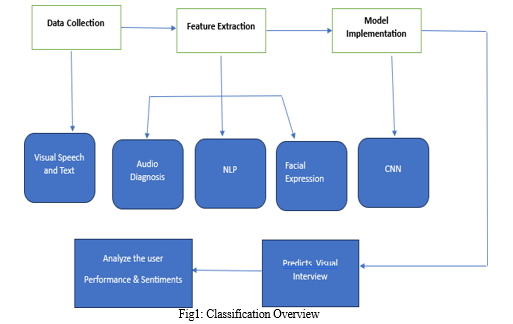
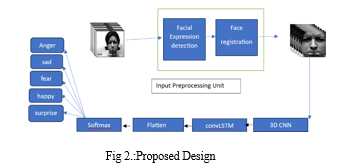
VII. ARCHITECTURE
The proposed architecture of our AI Based Mock – Interview Behavioural Recognition Analyst encompasses several interconnected components designed to facilitate comprehensive interview preparation, analysis, and feedback. Here's a detailed overview of each component:
A. User Interface
- The user interface serves as the primary interaction point for candidates participating in mock interviews.
- It provides functionalities for starting and completing interview sessions, as well as accessing feedback and performance analytics.
B. Input Modules
- The input modules are responsible for capturing various input modalities from candidates throughout the interview sessions.
- These modalities may include video feeds capturing facial expressions and body language, audio recordings of speech, and textual transcripts of interview responses.
C. Data Preprocessing
- The collected input data undergoes preprocessing to standardize and prepare it for further analysis.
- This may involve tasks such as noise reduction, feature extraction from audio and video inputs, and text normalization.
D. Feature Extraction and Representation
- Feature extraction techniques are applied to the preprocessed data to extract relevant features that represent different aspects of interviewee behavior, personality traits, and emotional states.
- For example, facial expression recognition algorithms may extract features related to facial muscle movements, while speech analysis techniques may extract features related to pitch, tone, and speaking rate.
E. Model Integration
- The extracted features are fed into multiple integrated models responsible for various tasks such as personality recognition, emotion detection, and speech analysis.
- These models may include deep learning models for facial emotion recognition, natural language processing models for textual analysis, and machine learning classifiers for personality assessment.
F. Decision Fusion
- The outputs from different models are fused or combined using decision fusion techniques to generate comprehensive insights into candidates' interview performance.
- This fusion process may involve combining confidence scores or probabilities from individual models to make final predictions or assessments.
G. Feedback Generation
- Based on the integrated analysis of user inputs, the classification generates personalized feedback for candidates.
- Feedback may include evaluations of communication skills, personality traits, emotional expressions, and overall interview performance.
- Feedback can be provided in various formats, including textual summaries, visualizations, and interactive reports.
H. User Analytics and Reporting
- The classification tracks and analyses candidates' performance over time, storing relevant metrics and analytics data.
- Candidates can access detailed reports and analytics dashboards to monitor their progress, identify strengths and areas for improvement, and track their development over multiple mock interview sessions.
I. Deployment and Integration
- The classification can be deployed as a standalone web or mobile application, allowing candidates to access it conveniently from any device.
- It can also be integrated with existing learning management classifications (LMS) or career development platforms to provide seamless access and integration into educational or professional training programs.
Overall, the proposed architecture integrates advanced technologies such as deep learning, natural language processing, and multimodal analysis to provide candidates with a comprehensive and effective platform for mock interview preparation and assessment
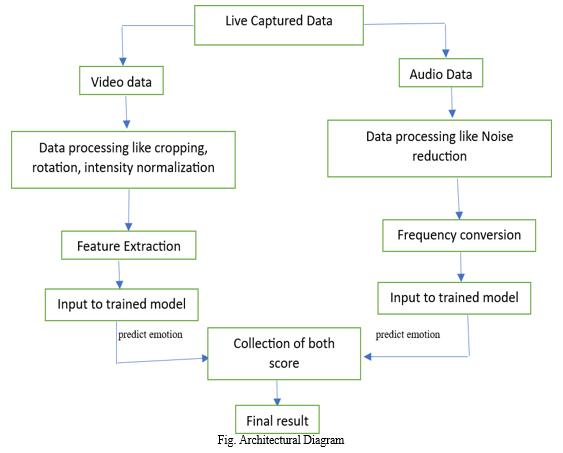
VIII. CLASSIFICATION METHODOLOGIES:
The procedure in the planned AI Based Mock – Interview Behavioural Recognition Analyst comprises a grouping of advanced technologies and procedures to examine various aspects of interviewee behaviour, nature traits, and emotional states. Here's a detailed summary of the classification procedure:
A. Multimodal Data Acquisition
- The classification captures multimodal data from candidates throughout mock interview sessions. This comprises:
- Video data: Capturing facial expressions, body language, and gestures by webcam or camera sensors.
- Audio data: Recording speech patterns, tone, and intonation using microphones.
B. Preprocessing and Normalization
- The developed data experiences preprocessing and normalization to normalize the inputs across different modalities.
- Preprocessing phases may contain noise reduction, data alignment, and feature extraction.
C. Facial Expression Recognition
- Facial expression recognition algorithms examine the video information to sense and categorize facial expressions indicative of different emotional states.
- Techniques such as Convolutional Neural Networks (CNNs) may be active for precise facial feature extraction and classification.
D. Speech Analysis
- Speech analysis algorithms advance the audio information to abstract features for instance pitch, tone, dialogue rate, and sentiment.
- Natural Language Processing (NLP) practices may be used to record speech to text and study linguistic patterns.
E. Personality Recognition
- Personality recognition algorithms mix information from facial expressions, speech analysis, and textual study to conclude candidates' temperament traits.
- Machine learning classifiers, such as Support Vector Machines (SVM) or Neural Networks, may be trained on labeled personality data for classification.
F. Emotion Detection and Classification
- Sentiment detection algorithms combine data from facial expressions, speech analysis, and textual analysis to sense and categorize candidates' sensitive states.
- Multimodal fusion classifications may be active to mix data from diverse sensory classification for more precise emotion acknowledgement.
G. Feedback Generation and Presentation
- Built on the combined analysis, the classification produces adapted feedback for candidates, important strengths, feebleness, and expanses for development.
- Response may be obtainable in various formats, as well as textual synopses, visualizations, and collaborative information.
By engaging this inclusive method, the anticipated classification purposes to deliver candidates with valued understandings and response to advance their interview assistances, statement efficiency, and inclusive presentation.
IX. ALGORITHMS AND BACKGROUND
Contextual: The anticipated classification purposes to transform the mock interview knowledge by leveraging progressive artificial intelligence (AI) methods to deliver candidates with personalized response and perceptions into their interview performance. With the increasing importance of soft skills and relational statement in the job marketplace, actual interview training has developed vital for achievement.
Though, traditional mock interview approaches regularly lack personalized response and intuitions, creating it stimulating for candidates to recognize and advance upon their feebleness. By participating state of the art algorithms and practices, the planned classification suggests a inclusive explanation to address these tests.
Algorithm: The future classification engages a grouping of machine learning, deep learning, and natural language processing (NLP) algorithms to diagnose several characteristics of candidates' behaviour, character traits, and expressive expressions throughout artificial interviews. Here's an summary of the main algorithms operated:
A. Facial Expression Recognition (FER)
- Develops deep learning models for instance convolutional neural networks (CNNs) to determine facial expressions taken in video fodders throughout mock interviews.
- Algorithms are skilled to sense and categorize facial expressions linked with diverse sentiments, with gladness, sadness, annoyance, and wonder.
B. Speech Analysis
- Spread over NLP techniques to inspect candidates' speech records and abstract linguistic features.
- Algorithms like natural language, sentiment analysis, and speech recognition considerate are used to evaluate the tone, sentiment, and content of candidates' speech throughout interviews.
C. Personality Recognition
- Engages machine learning algorithms, as well as Support Vector Machines (SVM), Decision Trees, or Neural Networks, to identify nature traits built on extracted features.
- Algorithms study patterns from labelled data to organize candidates into diverse character categories (e.g., extroversion, sociability) based on their behaviour and retorts throughout mock interviews.
D. Emotion Detection
- Exploits deep learning models, for example CNNs or recurrent neural networks (RNNs), to inspect facial expressions and detect expressive states displayed by candidates throughout interviews.
- Algorithms are skilled to categorize candidates' sensitive states, as well as gladness, sadness, anxiety, irritation, repulsion, and amazement.
E. Feedback Generation
- Built on the combined analysis, personalized feedback is made for candidates, as long as estimations of communication skills, behaviour traits, open expressions, and complete interview performance.
- Feedback is obtainable in various formats, with textual synopses, visualizations, and collaborative reports, to simplify candidates' thoughtful and development.
By deploying these unconventional algorithms and procedures, the projected classification suggests candidates a inclusive platform for artificial interview training and valuation, authorizing them to boost their interview assistances and flourish in the viable job market.
X. RESULT
The classification delivers inclusive interview assessment grades, plus speech patterns, facial expression analysis and performance metrics. Candidates can envision their performance in graphic format and equivalence results from various interviews to path their advancement.
The production outcomes detected from the projected AI Based Mock – Interview Behavioural Recognition Predictor suggest employers with valued visions into their interview performance, character traits, and expressive conditions. These outcomes are vital for handlers to comprehend their strong point, feebleness, and areas for development. Here's an indication of the predictable output results and their conforming score ethics measured or essential for examination.
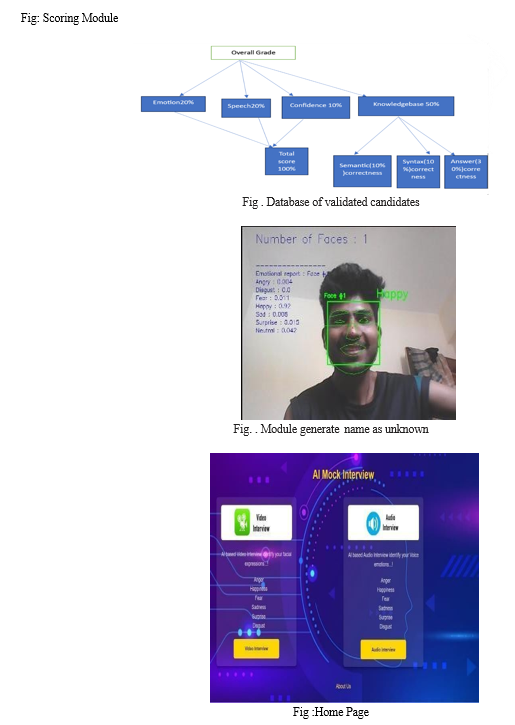
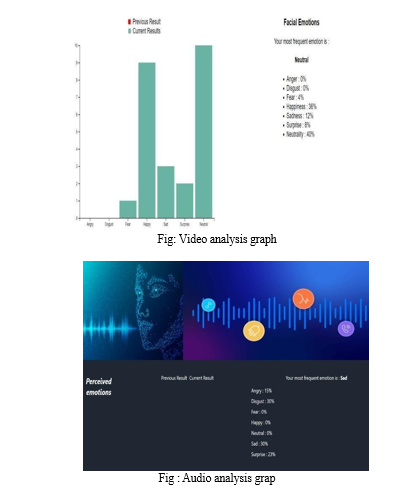
Conclusion
In conclusion, the anticipated AI Based Mock – Interview Behavioural Recognition Analyst signifies a important progress in interview training and valuation methods. By fit in cutting-edge technologies such as deep learning, natural language processing, and multimodal analysis, the classification offers candidates a complete platform to boost their interview skills, self-awareness, and professional development. In summary, the proposed AI Based Mock – Interview Behavioural Recognition Analyst holds huge probable to transform interview training and assessment processes, eventually authorizing candidates to realize their academic and professional aspirations with greater confidence and success. As progresses in AI and linked technologies endure to evolve, the scheme stands composed to show a crucial role in determining the upcoming of interview training and career expansion.
References
[1] Yi-Chi Chou, Felicia R. Wongso, Chun-Yen Chao and Han-Yen Yu, \"An AI Mock-interview Platform for Interview Performance Analysis\", 10th International Conference on Information and Education Technology, IEEE 2022. [2] Dulmini Yashodha Dissanayake, Venuri Amalya, Raveen Dissanayaka, Lahiru Lakshan, Pradeepa Samarasinghe, Madhuka Nadeeshani, et al., \"AI-based Behavioural Analyser for Interviews/Viva\", IEEE 16th International Conference on Industrial and Information Classifications (ICIIST),IEEE 2021. [3] Vikash Salvi, Adnan Vasanwalla, Niriksha Aute and Abhijit Joshi, \"Virtual Simulation of Technical Interviews\", IEEE, 2017. [4] Y. C. Chou and H. Y. Yu, \"Based on the application of AI technology in resume analysis and job recommendation\", IEEE International Conference on Computational Electromagnetics (ICCEM), pp. 291- 296,IEEE 2020. [5] Aditi S. More, Samiksha S. Mobarkar, Siddhita S. Salunkhe and Reshma R. Chaudhari, \"Smart Interview Using Ai\", Technical Reacher Organization Of India, 2022. [6] Danai Styliani Moschona, \"An Affective Service based on Multi-Modal Emo Don Recognition using EEG enabled Emotion Tracking and Speech Emotion Recognition\", IEEE, 2022. [7] Luis Felipe Parra Gallegoa and Juan Rafael Orozco-Arroyave, \"Classification of emotions and evaluation of customer satisfaction from speech in real-world acoustic environments\", ELSEVIER, 2022. [8] Xinpei Jin, Yulong Bian, Wenxiu Geng, Yeqing Chen, Ke Chu, Hao Hu, et al., \"Developing an Agent-based Virtual Interview Training Classification for College Candidates with High Shyness Leve\", IEEE, 2022. [9] Zelin Chen, Guoxin Qiu, Xiangyu Li, Caixia Li, Kexin Yang, Zhuanggui Chen, et al., \"Exploring the relationship between children\'s facial emotion processing characteristics and speech communication ability using deep learning on eye tracking and speech performance measures\", IEEE, 2022. [10] Qian Wang, Mou Wang, Yan Yang and Xiaolei Zhang, \"Multi-modal emotion recognition using EEG and speech signals\", ELSEVIER, 2022. [11] Ftoon Abu Shaqra, Rehab Duwairi and Mahmoud Al-Ayyoub, \"Recognizing Emotion from Speech Based on Age and Gender Using Hierarchical Models\", The 10th International Conference on Ambient Classifications Networks and Technologies (ANT) ELSEVIER, 2019. [12] Denae Ford, Titus Barik, Leslie Rand-Pickett and Chris Parnin, \"The Tech-Talk Balance: What Technical Interviewers Expect from Technical Candidates\", IEEE, 2017. [13] Dongdong Li, Jinlin Liu, Zhuo Yang, Linyu Sun and Zhe Wang, \"Speech emotion recognition using recurrent neural networks with directional self-attention\", IEEE, 2021. [14] Julie E. Sharp, \"Work in Progress: Using Mock Telephone Interviews with Alumni to Teach Job Search Communication\", IEEE, 2022.
Copyright
Copyright © 2024 Prof. Sakharam Kolpe , Sarvesh Patil, Jay Deshmukh , Suraj Jeughale , Yash Misal. This is an open access article distributed under the Creative Commons Attribution License, which permits unrestricted use, distribution, and reproduction in any medium, provided the original work is properly cited.

Download Paper
Paper Id : IJRASET61427
Publish Date : 2024-05-01
ISSN : 2321-9653
Publisher Name : IJRASET
DOI Link : Click Here
 Submit Paper Online
Submit Paper Online

